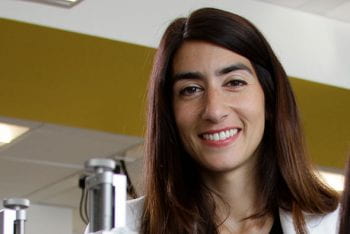Ream Al-Hasani Ph.D., assistant professor of pharmaceutical science at St. Louis College of Pharmacy and assistant professor of anesthesiology at Washington University School of Medicine in St. Louis, recently received a $70,000 Young Investigator Grant from the Brain and Behavior Research Foundation in support of her groundbreaking work in the field of opioid research. Al-Hasani conducts her research at the Center for Clinical Pharmacology, a joint research venture supported by the College and the School of Medicine.
“I’m honored to be recognized and supported by the Brain and Behavior Research Foundation,” Al-Hasani explained. “These grants are intended as an investment, not only in my current research, but in my future career as well. I will use these funds to expand my research to understand more about how opioids in the brain operate under both normal and extreme conditions.”
The Brain and Behavior Research Foundation established the Young Investigator Grant in 1987 to support young scientists with promising careers and innovations in the areas of neurobiological and psychiatric research.
The grant promotes innovative research opportunities and supports basic, translational and clinical researchers. Since 1987, the Brain and Behavior Research Foundation has given more than $408 million in Young Investigator Grants to 4,896 scientists worldwide.
As a well-known expert in the field of opioid research, Al-Hasani is focused on research related to the kappa opioid receptor, which is involved in both pain management and addiction.
Utilizing the two-year Young Investigator Grant, Al-Hasani will examine how the kappa opioid receptor is involved in everyday behaviors, such as eating or managing normal amounts of stress. She does this by measuring the peptides that bond with the kappa opioid receptor to trigger physical and emotional responses.
“Often, when we study the brain, we put it in an extreme circumstance and see how it responds,” Al-Hasani explained. “This time, I’m looking at how the peptides I study are triggered by normal activities, both positive and negative. Looking at the brain in less extreme circumstances will deepen our understanding of how the peptides work in a variety of conditions and help us develop better therapeutics.”
